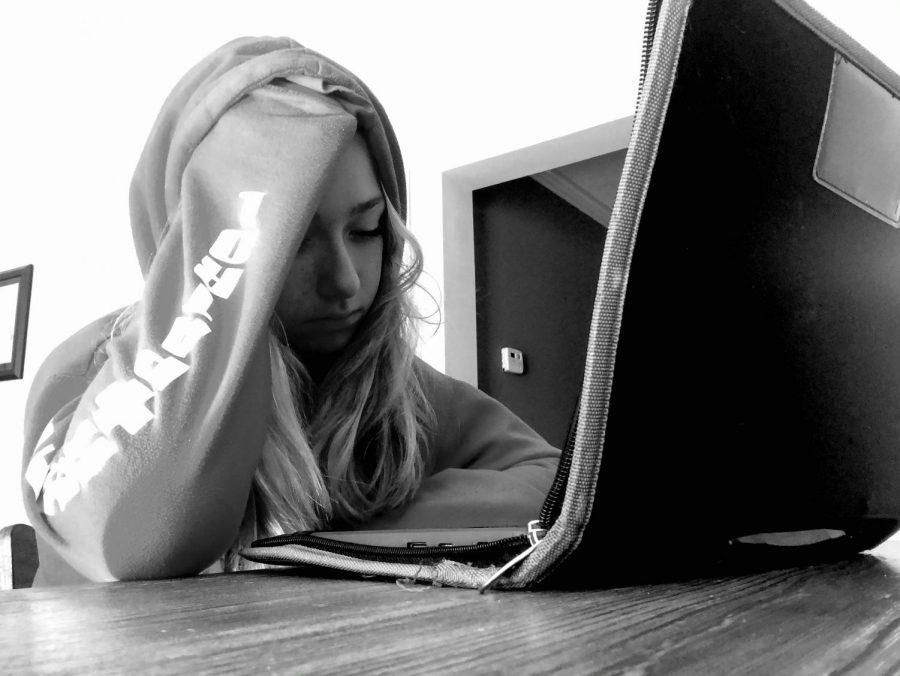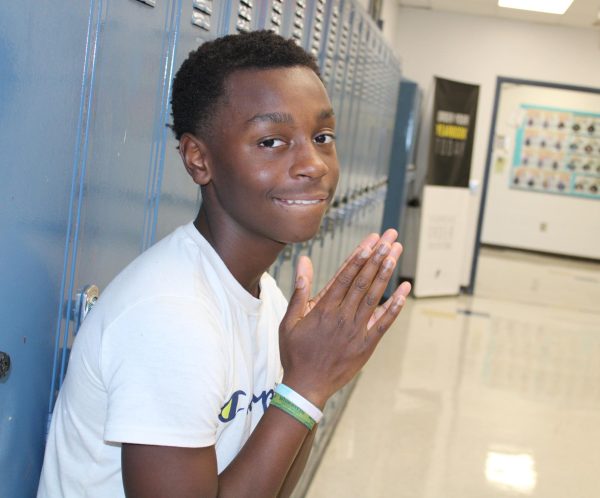Why the Mental Health in Students is Plummeting More Than Ever
Students and teachers struggle with mental health during these times, but could they be each others’ cause…?
Brooke Cannon (’22) feels overwhelmed by the workload of virtual schooling.
Wake up.
Go to school.
Study.
Sleep.
Every day is the same. The unpredictability is weighing down, but the predictability is even more crushing. Before, the routine was almost the same; but these days are different. All gray, all monotone.
We turn to our devices, always there, but never so pleasing as to fix the minds that were distraught and dragged on the ground for an entire year. We would turn to our friends, but they’re gone too. They cannot be there because of the imminent sickness. Everyone is experiencing a different thing, but it is the same.
When we got the call in March, we never would have guessed how long the “break” would take. It’s amazing; students were excited, excited for the change, for something new and life-changing. It was definitely so, but in the worst way imaginable.
The “break” really isn’t a break… at all.
As if the world burning and crumbling wasn’t enough stress, about twelve hours on average are spent each day just on schoolwork alone. Eight hours a day, 3.5 hours a night. And that does not include studying for tests. Too much for any mind, let alone an already troubled one.
We must understand that everyone is in the same boat, but the nurses and essential workers are in an even worse position. And, as a student and an essential worker, this is all just too much. Even for the teachers.
Enough is enough.
“I can’t seem to find the motivation to complete a two page ‘busy work’ assignment, when I have eight others waiting for me in my other classes,” an anonymous senior said. “Then, three tests this week, one quiz, and in-class and homework to do each day.”
This sounds overwhelming, right? This is only a normal schedule for many teens, not including sports and other activities, such as work or leisure. This is the thought process for many students.
“I think that school is not the best option for anyone right now… I have ADHD and [I] find it very hard to focus in school with everything else that is going on around me,” one junior said. “I know my grades are a lot worse than when I was at home.”
“I am not saying that it is the teachers’ faults, because I, and we, know that most of them are doing their very best,” another senior said. “It’s just that I wish they would care about our emotional and mental health more.”
This piece of writing is not to rebuke or argue, but simply to express an important and unfortunately common point of view amongst students. Many students feel that they cannot focus, or that they have no motivation to do schoolwork, whilst having to deal with a global pandemic, election and issues at home that may have stemmed from the virus.
In addition, this isn’t something that can necessarily be fixed. Mental health, especially in teenagers, is not something that can be fixed overnight. And there is little anyone can do.
However, it does help to have people to turn to and people to protect one from becoming too stressed.
Teachers and staff should care about the students, with and without the pandemic. Most teachers try their very best with what they can do. However, some are too caught up in everything else that, like students, they forget about the mental health of others.
“I know that a lot of people joke about this, but it is a problem,” one freshman said. “Teachers, and even some of mine, send out emails saying, ‘I know we are experiencing troubled times, and I wish you all the best! Oh and attached here is a three-page essay, worksheet and a quiz for over the weekend. Due Monday. Have a nice weekend!’. It’s really crazy. I hate it.”
Although this is true, many teachers mean the best, and are simply trying to help the students.
“I feel that kids are very stressed and anxious as the next couple months I think they’re worried about what this will do to their grades,” an anonymous teacher said.
Teachers acknowledge how students are feeling, because they understand. Everyone is doing their best right now to remain content, and to assist others that need a hand (socially distanced, of course). Everyone experiences a different thing during this time of tragedy.
“[I’ve found that] kids not quarantined are okay, but the kids that are quarantined that aren’t doing their work,” another teacher said. “Even if it’s available, they don’t do it. It makes me worried. It must be difficult because all teachers post things differently.”
A student reflects on a different point of view.
“I don’t feel like doing my work, especially if it’s hard to get to or hard to turn in,” the student says. “I feel that it’s busy work anyway. I mean, we learned this [the material] last year! I know they’re just trying to help, but I see it as unnecessary.”
This is a terrible thing for both students and teachers alike, but also for the school board members themselves.
“Imagine having to make all these crazy decisions,” one student wrote in an email. “I can hardly choose what to eat as a snack, let alone that.”
As quarantine reins on, we must ensure that everyone still feels included and that no one feels alone. Mental health is something to worry about normally, and so it is important to take it into consideration. In students, in teachers, in all people.
Mental health matters, especially now that we need each other more than ever.












